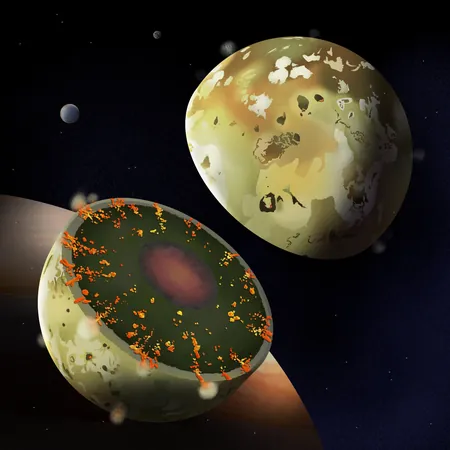
New Insights Challenge Long-Standing Beliefs About Io's Interior!
2024-12-12
Author: Arjun
Recent Findings on Io
Recent research has overturned previous assumptions about Jupiter's moon Io, suggesting that it does not possess a shallow global magma ocean beneath its surface. This groundbreaking conclusion, published in the prestigious journal Nature, comes from a collaborative team analyzing data from NASA's Juno spacecraft alongside historical observations.
Io's Volcanic Activity
Io, notorious for being the most volcanically active celestial body in our solar system, has long been thought to sustain its constant eruptions due to a subsurface magma ocean. This hypothesis was fueled by the belief that tidal forces, stemming from Io's elliptical orbit and Jupiter's immense gravitational pull, generate enough heat to melt its interior. However, the latest findings cast doubt on this theory and encourage scientists to rethink the moon’s geological structure.
The Research Methodology
The research team, led by Ryan Park, employed measurements taken during two recent Juno flybys to assess the extent of Io's tidal deformation. By analyzing these data in conjunction with previously gathered information, they discovered notable inconsistencies with models predicting the existence of a shallow magma ocean. This suggests that, rather than being a magma-filled sphere, Io likely has a predominantly solid mantle with potential pockets of magma deep within.
Broader Implications
The implications of these findings extend beyond Io itself. The longstanding belief that tidal heating universally results in shallow magma oceans is now in question, potentially prompting a reevaluation of other icy bodies in the solar system, such as Saturn's moon Enceladus and Jupiter's Europa. Understanding Io's geological behavior might refine our knowledge of planetary formation and evolution processes across the cosmos.
Conclusion and Future Exploration
As scientists continue to unravel the mysteries of these distant worlds, the question remains—what else do we not know about our intriguing solar system? Keep following for more updates on this fascinating topic!


 Brasil (PT)
Brasil (PT)
 Canada (EN)
Canada (EN)
 Chile (ES)
Chile (ES)
 España (ES)
España (ES)
 France (FR)
France (FR)
 Hong Kong (EN)
Hong Kong (EN)
 Italia (IT)
Italia (IT)
 日本 (JA)
日本 (JA)
 Magyarország (HU)
Magyarország (HU)
 Norge (NO)
Norge (NO)
 Polska (PL)
Polska (PL)
 Schweiz (DE)
Schweiz (DE)
 Singapore (EN)
Singapore (EN)
 Sverige (SV)
Sverige (SV)
 Suomi (FI)
Suomi (FI)
 Türkiye (TR)
Türkiye (TR)